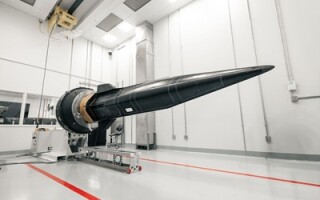Rugged, small form factor computer released by Versalogic
NewsAugust 29, 2012

EUGENE, OR. Engineers at VersaLogic Corp., have designed a rugged, credit-card sized embedded computer – the Falcon – that uses an Intel Atom E6x0T low-power processor.
The Atom E6x0T processor which is optimized for performance/power consumption balance. It provides compatibility with a range of x86 application development tools to reduce cost and development time. Its Integrated graphics provide hardware-accelerated MPEG-4/H.264 and MPEG-2 video encoding and decoding. It also includes a standard LVDS video output for flat panel displays.
Falcon's rugged “form-factor (EPU) integrates industrial grade processor, memory, storage, latching connectors for I/O, and heat dissipation options,” says Gary Schultz, Director of Marketing at VersaLogic. The embedded computer meets MIL-STD-202G specifications to withstand high impact and vibration. Soldered-on RAM, fanless thermal solutions, and latching connectors -- for Ethernet, SATA, and main I/O – enable more ruggedization for use in harsh environments. The device is available as an IPC-A-610 Class 2 assembly with Class 3 as an optional solution where required.
“Field reliability for our military customers is comprised of multiple dynamics related to their system’s environment including impact (shock), vibration, and temperature,” Schultz says. “For instance, the G forces exerted on an embedded system during shock and vibration directly relates to the height of the system. When a 3 or 4 board computer assembly is hard mounted to the bottom of a chassis, the G forces create additional stress on the highest components in the assembly making them prone to unexpected failure. The historical alternative was to spread out the components on a single PCB. This larger sized board will start to flex as the forces transfer to the width of the board with off-axis movements: this too causes field failures. Another factor needed to produce a field reliable product in military applications are the use of latching connectors. Typical connectors used on most embedded computers can come loose in military applications, causing intermittent operation. Other evolving conversations have been manufacturing complex embedded computers to the stringent IPC Class 3 standards, providing wide voltage input ranges standard on all products, and finding ways through COTS products to reduce overall system costs.
“Thermal challenges are actually one of the primary challenges embedded computer designers face today,” Schultz continues. “After extensive thermal modeling, we perform testing to ensure that the heat is dissipating where it needs to and at a fast enough rate to keep the board functioning. Very specialized TIM (Thermal Interface Material), machined heat slugs or heat plates (to maintain the flatness to match up exactly with the top of the processor and support chip), and spacers that make sure the plate is place at exactly the right height (without crushing the CPU die) are all combined to make what appears to be a very simple thermal solution.”
The Falcon’s on-board I/O includes Gigabit Ethernet with network boot capability, four USB 2.0 ports, four serial ports, as well as Intel High-Definition Audio (HDA). A SATA 3 Gb/s interface supports high-capacity rotating or solid-state drives. Dual microSD sockets and a Mini PCIe socket with mSATA capability provide flexible solid-state drive (SSD) options. Systems can be enhanced by leveraging the Mini PCIe socket with plug-in Wi-Fi modems, GPS receivers, MIL-STD-1553, Ethernet, Firewire, and other mini cards. The Falcon also supports an optional Trusted Platform Module (TPM) chip for use in applications that require enhanced hardware-level security functions. The Falcon’s wide input voltage range of 8 to 17 volts simplifies system power supply requirements. It also is compatible with automotive type -- nominal 12V -- power systems.
The Falcon will be available next month. Pricing begins at $853 for 1 GB RAM models in OEM quantities. For more information, contact [email protected] or visit www.versalogic.com.





